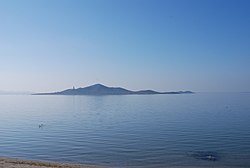Mar Menor
Mar Menor (Spanish pronunciation: [ˈmar meˈnor], "Minor sea") is a salty lagoon, in the southeast of the autonomous community of Murcia, in Spain. It separated from the Mediterranean sea by La Manga, a sandbar 22 kilometres (14 mi) in length and with a width ranging from 100 metres (330 ft) to 1,200 metres (3,900 ft).
Municipalities
It belongs to four municipalities: Cartagena, Los Alcázares, San Javier and San Pedro del Pinatar. It has a surface area of 135 square kilometres (52 sq mi).[1] It has a perimeter of 59.51 square kilometres (22.98 sq mi).[1] The warm and clear water is no more than 6 metres (20 ft) in depth.[1] It was called "the largest swimming pool in the world", by famous swimmer and Hollywood actress Esther Williams.
The water has a high salt content which aids in flotation. It is one of the most popular places in Europe for a wide variety of water sports.
First the Phoenicians and then the Moorish kings, chose this "small sea" as the site of their summer residences. Today, this area attracts all those who seek a quiet place to rest and relax. There are ideal weather conditions all year round.
Ecological importance of the Mar Menor
At the northern end there are salt marshes which include a wetland of international importance.[2][3] This area is conserved as a natural park run by the local government. Its Spanish name is "Salinas y Arenales de San Pedro del Pinatar". The microbes that live in this coastal lagoon have been recently described. [4]
In 1994 the Mar Menor was on the Ramsar Convention list for the conservation and sustainable use of wetlands. The Mar Menor is also part of a Specially Protected Area of Mediterranean Importance and is a Special Protection Area (ZEPA in Spanish) for bird life.
The Mar Menor was one of the top 100 finalists for 12 Treasures of Spain announced on 31 December 2007.
Gallery
Mar Menor
Mar Menor
Mar Menor
- La Manga natural del Mar Menor.jpg
Mar Menor
Mar Menor Media
References
- ↑ 1.0 1.1 1.2 Coastal Lagoons: Ecosystem Processes and Modeling for Sustainable Use and Development, eds. I. Ethem Gonenc; John P. Wolflin (Boca Raton, FL: CRC Press, 2004), p. 392
- ↑ Isabel Rubio (n.d.). "Information about Mar Menor in English". Biodiversity in the Mar Menor and the Mediterranean. Retrieved 12 October 2014.
- ↑ Lua error in Module:Citation/CS1/Identifiers at line 630: attempt to index field 'known_free_doi_registrants_t' (a nil value).
- ↑ Lua error in Module:Citation/CS1/Identifiers at line 630: attempt to index field 'known_free_doi_registrants_t' (a nil value).
Other websites
| Wikimedia Commons has media related to Lua error in Module:Commons_link at line 62: attempt to index field 'wikibase' (a nil value).. |
- Mar Menor Tourism Site Archived 2010-08-24 at the Wayback Machine
- Un-official La Manga del Mar Menor Tourism guide Archived 2011-10-08 at the Wayback Machine
- Mar Menor Activities Archived 2013-06-02 at the Wayback Machine
37°46′N 00°50′W / 37.767°N 0.833°WCoordinates: 37°46′N 00°50′W / 37.767°N 0.833°W


